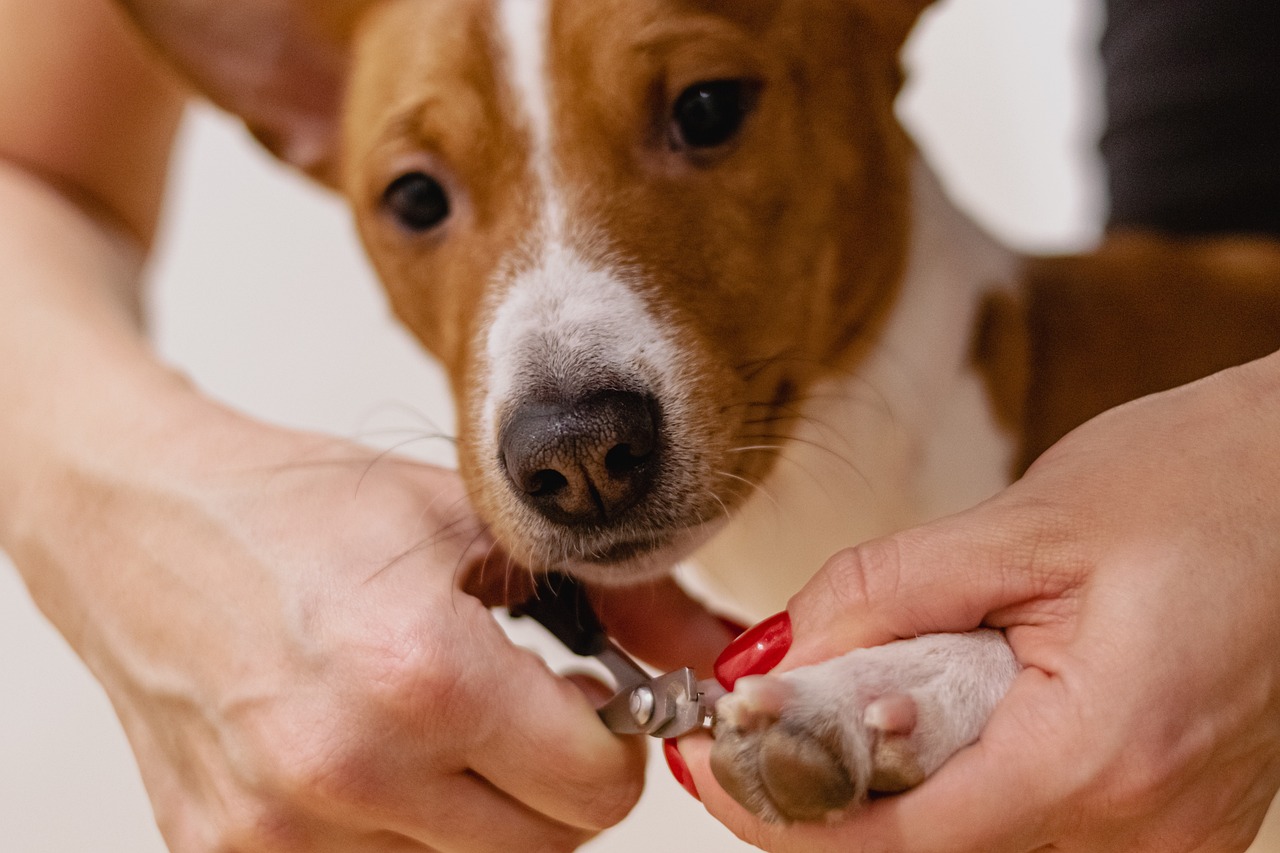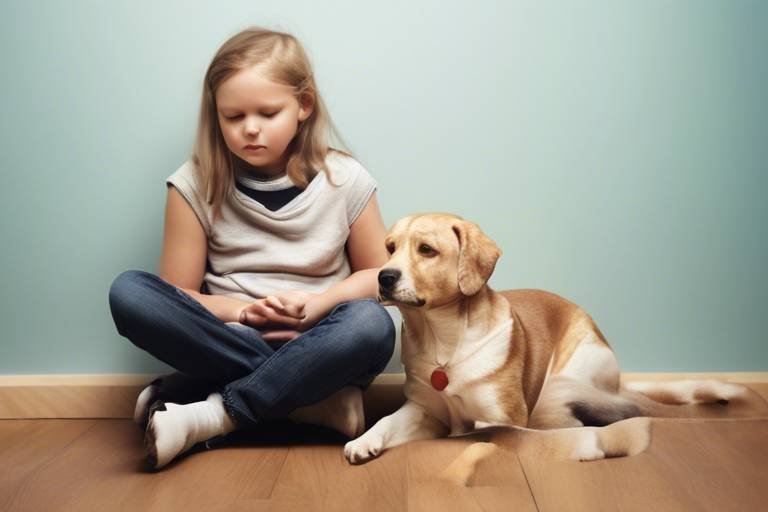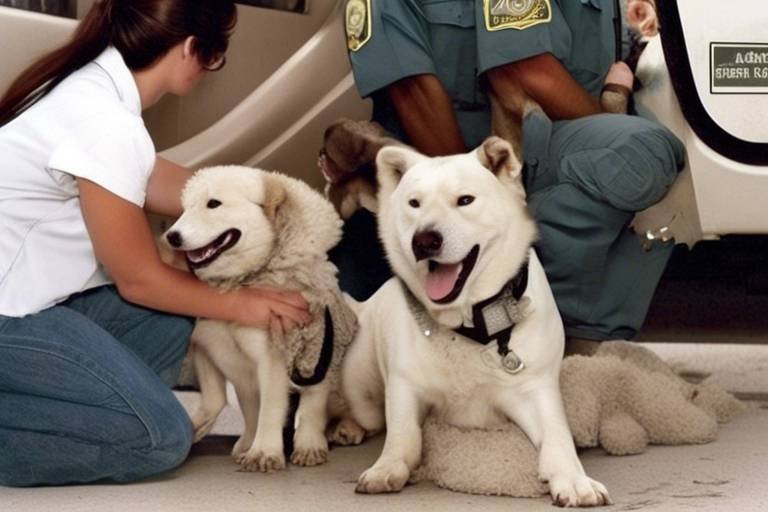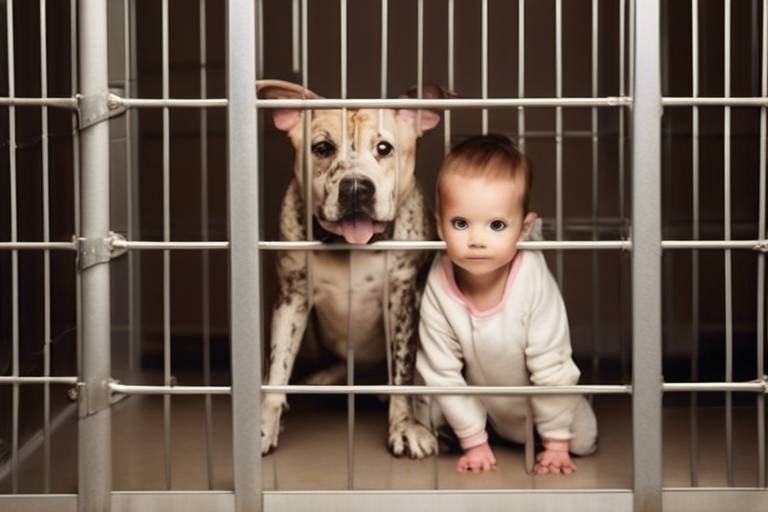The Impact of Pet Adoption on Community Wellbeing
Pet adoption is more than just bringing a furry friend into your home; it’s a transformative journey that ripples through the fabric of our communities. When individuals and families choose to adopt pets, they not only change the lives of these animals but also enhance their own lives and the wellbeing of those around them. Imagine walking through your neighborhood and seeing smiling faces, people engaging in conversations, and children playing with their pets. This vibrant scene is a testament to the profound impact that pet adoption has on community health, social connections, and emotional support.
One of the most significant outcomes of pet adoption is the emotional uplift it provides. Pets offer unconditional love and companionship, which can drastically reduce feelings of loneliness and isolation. For many, a pet becomes a confidant, a source of joy, and even a reason to get out of bed in the morning. This emotional support is especially crucial in today’s fast-paced world, where many people are battling stress and mental health challenges. The bond formed between humans and their pets can lead to increased happiness and a sense of purpose, creating a healthier and more vibrant community.
Furthermore, pets act as social catalysts. Have you ever noticed how a dog can spark a conversation between two strangers? Whether it’s at a dog park or on a walk, pets create opportunities for interaction among community members. This not only fosters friendships but also builds networks that enhance social cohesion. When people come together over a shared love for animals, they are more likely to support each other, leading to a stronger and more connected community.
Community events centered around pet adoption play a pivotal role in promoting awareness and encouraging responsible pet ownership. These events are not just about finding homes for animals; they serve as a platform for education, networking, and community engagement. By participating in adoption drives, residents can learn about the importance of spaying and neutering, proper pet care, and the responsibilities that come with pet ownership. Such initiatives strengthen community ties and create a culture of compassion and responsibility toward animals.
Additionally, volunteering at local shelters offers another avenue for enhancing community wellbeing. Shelters often rely on volunteers to help with pet care, which not only aids in the welfare of the animals but also allows individuals to connect with like-minded people. This engagement fosters a sense of community spirit and provides an outlet for those looking to contribute positively to their neighborhoods.
Support groups for pet owners can also be a valuable resource. These groups provide a safe space for individuals to share their experiences, challenges, and solutions related to pet ownership. They foster a sense of belonging and mutual support, which can be incredibly beneficial for mental health. Just like a book club brings readers together, a pet owner support group creates a community of shared experiences, enhancing the overall wellbeing of its members.
Local businesses play a crucial role in supporting pet adoption initiatives as well. By providing resources, sponsorships, and services, they not only benefit pets and their new families but also create a sense of community pride. For instance, pet-friendly cafes, grooming services, and pet supply stores often host events that promote adoption and responsible pet ownership. This collaboration between local businesses and the community can lead to a thriving environment where both pets and people feel valued and supported.
In conclusion, the impact of pet adoption on community wellbeing is profound and multifaceted. From emotional benefits to strengthened social connections and enhanced health, adopting a pet is a win-win situation. As we continue to promote pet adoption, we pave the way for healthier, happier communities where both humans and animals can thrive together.
- What are the benefits of adopting a pet? Adopting a pet can provide emotional support, companionship, and a sense of purpose, while also fostering social connections within the community.
- How can I get involved in pet adoption efforts? You can participate in community events, volunteer at local shelters, or support local businesses that promote pet adoption.
- Are there health benefits to owning a pet? Yes! Pet ownership is linked to reduced stress levels, increased physical activity, and improved cardiovascular health.

Emotional Benefits of Pet Adoption
Adopting a pet is like welcoming a new family member into your home, and the emotional benefits can be truly transformative. Imagine coming home to a wagging tail or a gentle purr; it’s a simple yet profound joy that can lift your spirits instantly. Pets provide companionship, which is especially valuable in a world where loneliness can creep in unexpectedly. For many, the bond with a pet can alleviate feelings of isolation, creating a sense of purpose and connection that enriches daily life.
Research has shown that the presence of pets can lead to significant reductions in stress and anxiety levels. When you stroke a cat or take a dog for a walk, your body releases oxytocin, the hormone associated with bonding and emotional connection. This biological reaction not only enhances your mood but also promotes feelings of happiness and contentment. In fact, many pet owners report feeling less anxious and more relaxed, simply by having their furry friends around.
Moreover, pets can serve as a source of unconditional love. They don’t judge, they don’t hold grudges, and they’re always there for you, no matter what. This kind of unwavering support can be a lifeline for individuals facing emotional challenges. For instance, a study from the Human-Animal Bond Research Institute found that pet ownership is linked to lower levels of depression and increased feelings of overall wellbeing. It's fascinating how a creature that cannot speak can communicate so much through their actions and presence.
Furthermore, pets can help foster a more positive outlook on life. They encourage routines and responsibilities, which can be particularly beneficial for those struggling with mental health issues. The act of caring for a pet—feeding them, grooming them, and playing with them—creates a sense of accomplishment and fulfillment. This daily engagement can provide a much-needed distraction from negative thoughts and promote a healthier mindset.
In addition to these emotional benefits, adopting a pet can also lead to a sense of community. Many pet owners find themselves connecting with others who share their love for animals. Whether it’s through dog parks, pet-friendly events, or social media groups, these connections can lead to lasting friendships and a supportive network. In essence, adopting a pet not only changes the life of the animal but also enriches the lives of their new owners and the broader community.
In conclusion, the emotional benefits of pet adoption are profound and far-reaching. From reducing loneliness and stress to fostering a sense of purpose and community, pets have a unique way of enhancing our emotional wellbeing. So, if you’re considering bringing a furry friend into your life, remember that the love and joy they bring can significantly improve not just your life, but the community around you as well.
- What are the emotional benefits of adopting a pet? Adopting a pet can reduce feelings of loneliness, provide companionship, and promote mental health by fostering a sense of purpose.
- How do pets help with stress relief? Interacting with pets can lower stress levels through the release of oxytocin, which enhances feelings of happiness and relaxation.
- Can pets help improve social connections? Yes, pets can serve as social catalysts, helping owners connect with others who share similar interests in pet care and activities.

Social Connections Through Pet Ownership
When you think about owning a pet, what comes to mind? For many, it’s not just the joy of cuddling with a furry friend or the satisfaction of a wagging tail greeting you at the door. It’s also about the connections that come along with it. Pets can serve as incredible social catalysts, bridging the gap between individuals and fostering a sense of community. Imagine walking your dog in the park and striking up a conversation with another dog owner. Suddenly, you’re not just two strangers; you’re part of a shared experience, bonded by your love for your pets.
In fact, studies have shown that pet ownership can significantly enhance social interactions. Dog parks, for instance, are a melting pot of social activity. Pet owners gather to let their dogs play while they engage in conversations, share tips, and even make lasting friendships. These interactions can lead to a stronger sense of belonging and community, as people find common ground through their pets. It’s like having an instant icebreaker—who needs small talk about the weather when you can discuss your pup’s latest antics?
Moreover, pets often encourage us to step outside our comfort zones. Whether it’s attending a local pet fair, joining a dog-walking group, or participating in community events, pet ownership opens up opportunities for social engagement. These activities not only promote responsible pet ownership but also create networks of support among pet lovers. You might even find yourself volunteering at a local shelter, where you can meet like-minded individuals who share your passion for animals.
The joy doesn’t stop there! Many communities organize events specifically centered around pets, such as adoption drives, pet parades, and charity walks. These events serve dual purposes: they promote awareness about pet adoption and create a platform for residents to connect. Imagine a community event where families come together, showcasing their adopted pets while sharing stories of their journeys. It’s a heartwarming scene that strengthens community ties and fosters a sense of unity.
To illustrate the impact of these social connections, let’s take a look at some common benefits pet owners experience:
| Benefit | Description |
|---|---|
| Increased Social Interaction | Pet owners often meet new people through their pets, leading to new friendships. |
| Community Engagement | Participating in pet-related events fosters a sense of belonging and civic pride. |
| Support Networks | Pet owners can share experiences, advice, and support, creating a community of care. |
In conclusion, the social connections fostered through pet ownership are invaluable. They not only enrich our lives but also contribute to a healthier, more cohesive community. So, the next time you consider adopting a pet, remember that you’re not just bringing home a companion—you’re also opening the door to a world of social opportunities and connections that can enhance your life in ways you might never have imagined.
Community Events and Pet Adoption Drives
Community events centered around pet adoption serve as powerful platforms for enhancing awareness and promoting responsible pet ownership. These events are not just about finding homes for pets; they are vibrant gatherings that bring together people from all walks of life, fostering a sense of unity and shared purpose. Imagine a sunny Saturday afternoon filled with laughter, wagging tails, and the joyful barks of dogs eager to meet potential families. This is the essence of pet adoption drives.
During these events, various local organizations, shelters, and rescue groups collaborate to showcase pets available for adoption. The atmosphere is often electrifying, with activities designed to engage families and individuals alike. From petting zoos to training demonstrations, there’s something for everyone. Attendees can experience firsthand the joy of interacting with animals, which can ignite a spark of compassion and a desire to adopt.
Moreover, community events also provide educational resources. Workshops and informational booths often cover critical topics such as:
- Responsible pet ownership
- Understanding pet behavior
- Health and wellness tips for pets
These elements not only inform prospective pet owners but also help current pet owners enhance their caregiving skills. The exchange of knowledge creates a ripple effect, empowering individuals to make informed decisions about pet care, which ultimately benefits the entire community.
Another significant aspect of these events is the opportunity for local businesses to get involved. Many businesses sponsor adoption drives, providing food, supplies, and services that help facilitate the event. This collaboration not only boosts the local economy but also strengthens community ties. When businesses support pet adoption initiatives, they demonstrate a commitment to the community's wellbeing, enhancing their reputation and fostering customer loyalty.
In addition to the immediate benefits of pet adoption, these events often lead to lasting relationships. New pet owners frequently connect with each other, forming friendships through shared experiences and challenges of pet ownership. This network of support can be invaluable, as pet owners exchange tips, arrange playdates for their pets, and even collaborate on community projects related to animal welfare.
In conclusion, community events and pet adoption drives are more than just opportunities to adopt a pet; they are celebrations of community spirit. They unite people, educate them about responsible pet ownership, and foster lasting relationships that enhance social cohesion. So, the next time you see a pet adoption event in your neighborhood, consider attending – you might just find your new best friend while contributing to a healthier, happier community.
Volunteer Opportunities at Shelters
Volunteering at animal shelters is not just about helping pets; it’s a transformative experience that can significantly enrich your life while also benefiting the community. When you step into a shelter, you’re stepping into a world full of wagging tails and soft purrs, waiting for someone like you to make a difference. Imagine the joy of giving a furry friend the love and care they deserve, while simultaneously forging connections with fellow animal lovers. It’s a win-win!
One of the most rewarding aspects of volunteering at shelters is the chance to engage in various activities that directly impact the wellbeing of the animals. From walking dogs to socializing cats, each task plays a vital role in helping these pets become more adoptable. Regular interaction helps them develop social skills and reduces anxiety, making them more appealing to potential adopters. Plus, it’s hard not to feel a surge of happiness every time you see a previously shy dog come out of its shell, all thanks to your efforts.
But it’s not just the animals who benefit. Volunteers often find themselves forming deep bonds with other like-minded individuals. It’s a community within a community, where friendships flourish over shared passions and mutual goals. You might start as a solo volunteer, but before you know it, you’ll be part of a tight-knit group that celebrates each other’s successes, whether it’s finding a forever home for a pet or organizing a successful fundraising event.
If you’re considering volunteering, you might be wondering what opportunities are available. Most shelters offer a variety of roles, including:
- Animal Care: Feeding, grooming, and exercising animals.
- Administrative Support: Assisting with paperwork, social media, and marketing efforts.
- Event Planning: Helping organize adoption events, fundraising activities, and community outreach programs.
- Foster Care: Providing temporary homes for pets until they find permanent families.
Each role is crucial and contributes to the overall mission of the shelter. The best part? You don’t need to be an expert to start. Most shelters provide training and guidance, ensuring you feel comfortable and confident in your role. So, whether you’re a seasoned animal lover or just looking to make a positive impact, there’s a place for you!
Moreover, volunteering can also be a fantastic way to gain experience, especially for those interested in pursuing a career in veterinary medicine, animal behavior, or social work. The skills you acquire while volunteering—like teamwork, communication, and problem-solving—are invaluable and can enhance your resume. Who knows? You might even discover a new passion or career path along the way.
In summary, volunteering at shelters is a powerful way to give back to the community, improve the lives of animals, and connect with others. It’s an opportunity to be part of something bigger than yourself, to contribute to the wellbeing of both pets and people. So, why not take the plunge? Your community—and those adorable pets—are waiting for you!
Q: How do I find volunteer opportunities at local shelters?
A: Most shelters have a dedicated section on their website detailing volunteer opportunities. You can also visit the shelter in person or contact them directly for more information.
Q: Do I need prior experience to volunteer?
A: No prior experience is typically required! Shelters often provide training for new volunteers, so don’t hesitate to reach out.
Q: How much time do I need to commit?
A: Commitment levels vary by shelter. Some may ask for a few hours a week, while others are more flexible. It’s best to discuss your availability with the shelter staff.
Q: Can I volunteer with my children?
A: Many shelters welcome family volunteers, but specific age requirements may apply. Check with your local shelter for their policies.
Support Groups for Pet Owners
Support groups for pet owners are more than just a gathering of like-minded individuals; they are a sanctuary for sharing experiences, challenges, and victories. Imagine walking into a room filled with fellow pet lovers, each with their own unique stories, yet all united by the profound bond they share with their furry companions. These groups create a safe space where owners can discuss everything from training tips to health concerns, ensuring that no one feels alone in their journey of pet ownership.
These support networks often meet regularly, offering a mix of structured discussions and casual meet-ups. For those who may feel overwhelmed by the responsibilities of pet care, these gatherings can provide not only practical advice but also emotional support. After all, owning a pet can be both rewarding and challenging. Whether it's coping with a pet's separation anxiety or navigating the complexities of pet behavior, having a community to lean on can make all the difference.
Additionally, these groups often organize activities that foster deeper connections among members. From group walks in the park to training workshops, these events not only strengthen the bonds between pets and their owners but also encourage friendships among the participants. It’s a beautiful cycle: as pet owners share their experiences, they build a sense of camaraderie that extends beyond the four-legged friends they adore.
Moreover, support groups can also serve as a valuable resource for finding local services, such as veterinarians, groomers, and trainers. Members often share recommendations based on their own experiences, helping each other navigate the sometimes overwhelming landscape of pet care. This exchange of information can save time, money, and stress, making pet ownership a more enjoyable experience.
In essence, support groups for pet owners not only enhance the individual experience of pet ownership but also contribute significantly to the overall wellbeing of the community. They foster a culture of empathy, understanding, and shared responsibility, which is crucial in creating a supportive environment for both pets and their human companions.
In conclusion, if you're a pet owner seeking connection and support, consider joining a local pet owner support group. You'll find a wealth of knowledge, a network of friends, and a community that celebrates the joys and challenges of pet ownership together.
- What is a pet owner support group? A pet owner support group is a community where pet owners can meet to share experiences, advice, and support regarding pet care.
- How can I find a support group near me? You can search online for local pet owner support groups, check social media platforms, or visit community centers for information.
- Are there any costs associated with joining a support group? Most support groups are free or have a minimal fee to cover refreshments and materials. It's best to inquire directly with the group.
- Can I bring my pet to the meetings? Many support groups encourage bringing pets, as it allows for socialization and interaction among the animals.
- What topics are typically discussed in these groups? Topics can range from training and behavior issues to health concerns and general pet care tips.
Local Businesses and Pet Adoption
Local businesses play a crucial role in supporting pet adoption initiatives, creating a ripple effect that benefits both pets and their new families. When businesses engage with animal shelters and adoption agencies, they not only help to raise awareness about the importance of adopting pets but also foster a sense of community responsibility. Think of it as a partnership where everyone wins—pets find loving homes, and businesses gain loyal customers who appreciate their commitment to social causes.
Many local shops and services have started to incorporate pet-friendly practices into their operations. For instance, pet supply stores often collaborate with shelters to host adoption events, showcasing adorable animals looking for forever homes. These events create a lively atmosphere that draws in potential adopters while also boosting foot traffic for the business. It’s like throwing a party where everyone leaves with a new friend—how great is that?
Moreover, local cafes and restaurants are increasingly becoming pet-friendly, allowing patrons to bring their furry companions along. This not only enhances customer experience but also encourages pet ownership. When people see others enjoying their time with pets in public spaces, it sparks conversations and connections. It’s a beautiful cycle of community building that starts with a wagging tail or a gentle purr.
To further illustrate the impact of local businesses on pet adoption, consider the following table that highlights various ways businesses can contribute:
| Business Type | Contribution |
|---|---|
| Pet Supply Stores | Host adoption events and provide discounts for new pet owners. |
| Cafes/Restaurants | Offer pet-friendly spaces and promote adoption awareness through signage. |
| Veterinary Clinics | Partner with shelters for health checks and vaccinations for adopted pets. |
| Grooming Services | Provide discounted grooming for adopted pets, encouraging new owners to care for their pets. |
Additionally, many businesses are stepping up by sponsoring local animal shelters. This sponsorship can take many forms, such as financial support, providing supplies, or even hosting fundraising events. These collaborations not only help shelters operate more efficiently but also raise public awareness about the importance of pet adoption. When businesses take an active role in these initiatives, they send a strong message that they care about the community and its furry residents.
In conclusion, local businesses are not just places where we shop or dine; they are integral parts of the community that can significantly influence pet adoption rates. By partnering with shelters and promoting pet-friendly practices, they help create a supportive environment for both pets and their new families. So, the next time you see a local business championing pet adoption, remember that they are making a positive impact—one paw at a time!

Health Benefits of Pet Ownership
Owning a pet is not just about having a furry friend to cuddle with; it’s about unlocking a treasure trove of health benefits that can transform your life. Numerous studies have shown that pet ownership is linked to a myriad of positive health outcomes, ranging from improved mental health to enhanced physical fitness. Imagine this: every time you pet your dog or cat, you're not just showing love; you're also boosting your own wellbeing! It’s a win-win situation.
One of the most significant advantages of having a pet is the reduction in stress levels. Just think about it—after a long, hectic day, coming home to a wagging tail or a gentle purr can instantly lift your spirits. Research indicates that interacting with pets can lower cortisol levels, the hormone primarily responsible for stress. In fact, a study found that pet owners often report feeling less anxious and more relaxed than those without pets. It’s like having a natural therapist at home, always ready to listen without judgment.
Additionally, owning a pet can lead to an increase in physical activity. Dogs, in particular, require regular walks, which means you’re not just giving them exercise but also getting your daily dose of movement. This can be a game-changer for those who struggle to maintain an active lifestyle. A simple stroll around the block can easily turn into a fun adventure for both you and your furry companion. According to the American Heart Association, dog owners are more likely to meet their physical activity guidelines compared to non-dog owners. It’s like having a built-in workout buddy!
Moreover, the health benefits of pet ownership extend beyond just physical activity and stress relief. Pets can also have therapeutic effects on their owners. For instance, therapy animals are often used in hospitals and rehabilitation centers because their presence can help reduce pain and anxiety. The unconditional love and companionship of a pet can aid in recovery from trauma and even help alleviate symptoms of depression. Just picture a child recovering from surgery, finding solace in the soft fur of a therapy dog—this is the kind of healing that pets can provide.
Let’s not forget about the cardiovascular benefits associated with pet ownership. Studies have shown that pet owners tend to have lower blood pressure and cholesterol levels, which significantly reduces the risk of heart disease. Owning a pet can encourage a more active lifestyle and promote healthier habits, leading to a longer, healthier life. In fact, a study published in the journal Circulation found that pet owners had a 30% to 40% lower risk of heart disease compared to non-pet owners. It’s as if your pet is not just a companion but a guardian of your heart!
In summary, the health benefits of pet ownership are vast and varied. From reducing stress and increasing physical activity to providing therapeutic support and enhancing cardiovascular health, pets have a profound impact on our overall wellbeing. So, if you’re considering adding a furry friend to your family, know that you’re not just gaining a pet; you’re investing in your health and happiness.
- What are the main health benefits of owning a pet?
Owning a pet can reduce stress, increase physical activity, provide therapeutic support, and improve cardiovascular health. - Can pets help with mental health issues?
Yes, pets can provide companionship and emotional support, which can aid in alleviating symptoms of anxiety and depression. - Do pets encourage physical activity?
Absolutely! Pets, especially dogs, require regular walks and playtime, which promotes a more active lifestyle. - How do pets affect heart health?
Studies show that pet owners often have lower blood pressure and cholesterol levels, reducing their risk of heart disease.
Physical Activity and Pets
When it comes to staying active, pets—especially our furry friends like dogs—are like built-in personal trainers. Have you ever noticed how a simple game of fetch can turn into an exhilarating workout? It's fascinating how these little moments can lead to significant health benefits for pet owners. Not only do pets encourage us to step outside and enjoy the fresh air, but they also help us establish a routine that incorporates physical activity into our daily lives.
Consider this: a dog needs regular walks, playtime, and even some training sessions. This means that as a pet owner, you're naturally inclined to get moving. Whether it’s brisk walks around the neighborhood, jogs in the park, or energetic play sessions in the backyard, these activities can significantly contribute to your overall fitness. In fact, studies have shown that dog owners tend to be more active than those without pets. It's almost like having a furry cheerleader pushing you to get off the couch and enjoy life!
But the benefits of pet-related physical activity extend beyond just the immediate exercise. Engaging in regular physical activity with your pet can lead to long-term health improvements. Here are a few key benefits:
- Improved Cardiovascular Health: Regular walks and playtime can help lower blood pressure and cholesterol levels, reducing the risk of heart disease.
- Weight Management: Staying active with your pet can help you maintain a healthy weight, as the added exercise contributes to burning calories.
- Enhanced Mental Wellbeing: Physical activity releases endorphins, which can lift your mood and reduce feelings of anxiety and depression.
Moreover, the bond you create with your pet during these activities can lead to a more fulfilling relationship. Imagine taking a leisurely stroll in the park, your dog happily trotting beside you, tail wagging with excitement. This not only strengthens your connection but also allows you to enjoy the beauty of nature together. It's a win-win situation!
In addition to dogs, other pets can also encourage physical activity in different ways. For instance, cats can engage you in playful activities that require you to move around, such as using feather toys or laser pointers. Even small pets like rabbits or guinea pigs can inspire you to create safe play areas where you can interact and exercise with them. The key takeaway here is that any pet can motivate you to be more active, which is essential for maintaining a healthy lifestyle.
So, next time you think about adopting a pet, remember that it’s not just about companionship; it’s also about enhancing your physical health. Embracing a pet into your life could very well be the push you need to lead a more active and fulfilling life. After all, who wouldn’t want a furry friend to keep them company on their journey to better health?
1. How much exercise do pets need?
Most dogs require at least 30 minutes to 2 hours of exercise each day, depending on their breed and age. Cats, on the other hand, enjoy short bursts of playtime throughout the day.
2. Can pets really help reduce stress?
Absolutely! Interacting with pets has been shown to lower stress levels and increase feelings of happiness and relaxation. The simple act of petting a dog or cat can release feel-good hormones in your brain.
3. What types of activities can I do with my pet?
You can engage in various activities such as walking, running, playing fetch, hiking, or even participating in agility training. The possibilities are endless!
4. Are there any health risks associated with pet ownership?
While pet ownership can bring numerous benefits, it’s essential to be aware of potential health risks, such as allergies or zoonotic diseases. Regular vet check-ups and proper hygiene can mitigate these risks.
Therapeutic Effects of Pets
Pets have an incredible ability to provide comfort and healing to their owners, often serving as a source of emotional support during challenging times. Imagine coming home after a long day, feeling overwhelmed and stressed. The moment you step through the door, your furry friend greets you with wagging tails or gentle purrs, instantly lifting your spirits. This simple interaction can release oxytocin, the "love hormone," which promotes feelings of happiness and reduces stress levels.
Research has shown that pets can significantly aid in the recovery from various mental health issues, including anxiety and depression. In fact, therapy animals are increasingly being used in hospitals, schools, and rehabilitation centers to help individuals cope with emotional trauma. The presence of an animal can create a sense of security and calmness, allowing people to express their feelings more openly. Just petting a dog or cat can lower blood pressure and improve overall mood, which is a testament to the profound bond between humans and animals.
Furthermore, owning a pet can encourage routines and responsibilities that contribute to a person's mental stability. For instance, feeding, walking, and caring for a pet can provide structure to a day, which is particularly beneficial for those struggling with mental health challenges. This routine not only helps in maintaining a sense of purpose but also fosters a connection to the world outside oneself, which can sometimes feel overwhelming.
In addition to these emotional benefits, pets can also help in social situations. They act as icebreakers, making it easier for pet owners to meet new people and engage in conversations. For example, dog owners often find themselves chatting with fellow dog lovers at parks or during walks, leading to new friendships and support networks. This social interaction can combat feelings of isolation and loneliness, which are common in many mental health conditions.
Moreover, the therapeutic effects of pets extend beyond just emotional support. Studies have shown that pet ownership is linked to improved physical health as well. For instance, owning a dog often means regular walks, which increase physical activity and promote cardiovascular health. This combination of physical and emotional benefits creates a holistic approach to wellness that is hard to replicate.
In summary, the therapeutic effects of pets are profound and multifaceted. They not only provide companionship and emotional support but also encourage healthier lifestyles and social interactions. As we continue to explore the bond between humans and animals, it becomes increasingly clear that adopting a pet can lead to a more fulfilling and healthier life.
- How do pets help with anxiety? Pets provide comfort and companionship, helping to alleviate feelings of anxiety through their presence and unconditional love.
- Can pets improve mental health? Yes, pets can significantly improve mental health by providing emotional support, reducing feelings of loneliness, and encouraging social interactions.
- What types of pets are best for therapeutic effects? While dogs and cats are the most common, other pets like rabbits, guinea pigs, and even birds can also provide therapeutic benefits.
- How can I incorporate a pet into my therapeutic routine? Consider adopting a pet that fits your lifestyle and needs, and engage in regular activities together, such as walks or playtime, to enhance the bond.
Frequently Asked Questions
- What are the emotional benefits of adopting a pet?
Adopting a pet can significantly enhance your emotional wellbeing. Pets provide companionship, which can reduce feelings of loneliness and isolation. They also promote mental health by offering unconditional love and support, making them a great addition to any family.
- How do pets foster social connections in the community?
Pets often act as social catalysts, encouraging interactions among community members. When you take your dog for a walk or visit a pet park, you're likely to meet fellow pet owners, fostering friendships and creating networks that enhance social cohesion.
- What role do community events play in pet adoption?
Community events focused on pet adoption help raise awareness about the importance of responsible pet ownership. They connect residents and promote the idea of adopting pets, ultimately strengthening community ties and encouraging more people to consider giving a forever home to an animal in need.
- How can volunteering at shelters benefit the community?
Volunteering at animal shelters not only aids in the care of pets but also allows you to engage with other community members. It's a fantastic way to meet new people, share experiences, and contribute positively to your local wellbeing, all while making a difference in the lives of animals.
- Are there support groups for pet owners?
Yes! Support groups for pet owners provide a platform to share experiences, challenges, and solutions. These groups foster a sense of belonging and mutual support, helping pet owners feel connected and understood within their community.
- How do local businesses support pet adoption initiatives?
Local businesses play a crucial role in supporting pet adoption by providing resources, sponsorships, and services. They often collaborate with shelters to promote adoption events, offer discounts to new pet owners, and contribute to the overall wellbeing of pets and their families.
- What health benefits are associated with pet ownership?
Owning pets is linked to numerous health benefits, including reduced stress levels and increased physical activity. Studies show that pet owners often enjoy improved cardiovascular health, as the presence of pets encourages a more active lifestyle.
- How do pets encourage physical activity?
Pets, especially dogs, are great motivators for physical activity. They require regular walks, playtime, and exercise, which encourages their owners to be more active. This not only promotes a healthier lifestyle but also helps reduce the risk of chronic illnesses.
- Can pets have therapeutic effects on mental health?
Absolutely! The presence of pets can have profound therapeutic effects. They can aid in recovery from trauma, anxiety, and depression, enhancing overall community mental health. Many people find that their pets provide comfort and emotional support during tough times.



















